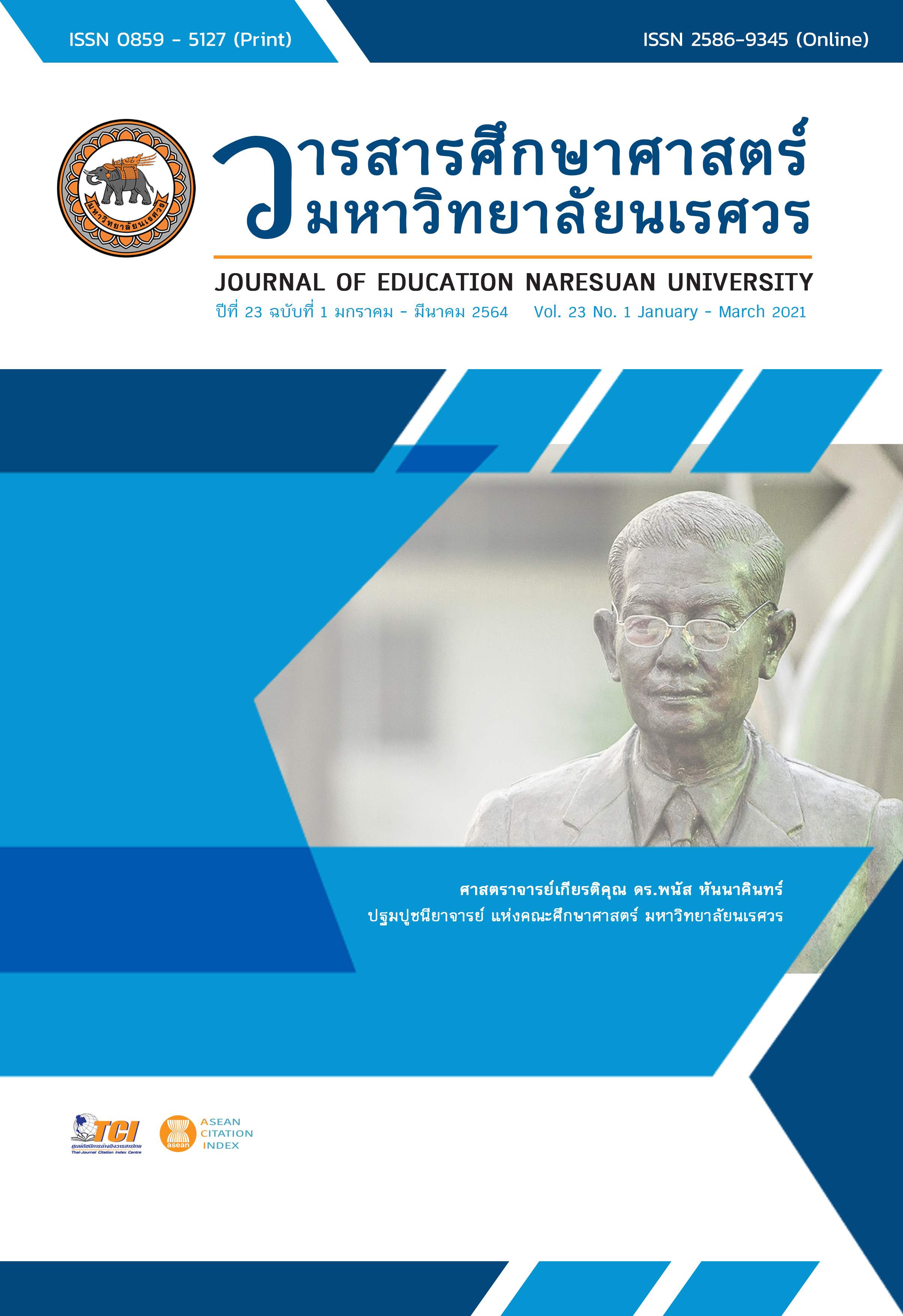TEACHING STRATEGIES FOR READING COMPREHENSION: ADHD STUDENTS กลวิธีการสอนอ่านเพื่อความเข้าใจสำหรับผู้เรียนสมาธิสั้น
Main Article Content
Abstract
This article presents reading comprehension strategies for ADHD students including Reciprocal teaching and TWA teaching (Think Before Reading, Think While Reading, and Think After Reading). The article is for supporting Thai language teachers in point of the reading comprehension guidelines for learners of various styles, and also provides the teaching processes which encourage self-regulated learning of students based on the cooperative learning and analytical thinking. Furthermore, the proposed teaching strategies can support the development of reading comprehension skills for further learning in other courses and lifelong learning.
Article Details
The owner of the article does not copy or violate any of its copyright. If any copyright infringement occurs or prosecution, in any case, the Editorial Board is not involved in all the rights to the owner of the article to be performed.
References
American Psychiatric Association. (2013). Diagnostic and statistical manual of mental disorders (5th ed.). Washington, DC: Author.
Esam, G. (2015). The effects of advance graphic organizers strategy intervention on improving reading comprehension of struggling readers in primary five. International Journal of Phycho-Educational Sciences, 8(1), 24-30.
Gillies, R. M. (2016). Cooperative learning: Review of research and practice. Australian Journal of Teacher Education, 41(3), 39-54.
Harris, K. R., & Graham, S. (1999). Programmatic intervention research: Illustrations from the evolution of self-regulated strategy development. Learning Disabilities Quarterly, 22, 251-262.
Hoyt, L. R. (2010). The effects of self-regulated strategy development (SRSD) on reading comprehension for secondary students with emotional and behavioral disabilities (Doctoral dissertation). Washington: University of Washington.
Khammani, T. (2013). Teaching science: Knowledge for learning management process. Bangkok: Chulalongkorn University Press. [in Thai]
Khuhapinant, C. (1999). Making books for children (4th ed.). Bangkok: Amon Karnphim. [in Thai]
Limsuwan, N., & Wisajun, P., (2017). Clinical presentations of attention-deficit/hyperactivity disorder in adults. Journal of the Psychiatric Association of Thailand, 62(2), 139-148. [in Thai]
Lundberg, I., & Reichenberg, M. (2013). Developing reading comprehension among students with mild intellectual disabilities: An intervention study. Scandinavian Journal of Educational Research, 57(1), 89-100.
Mason, L. H., Snyder, K. H., Sukhram, D. P., & Kedem, Y. (2006). TWA plus PLANS strategies for expository reading and writing: Effects for nine fourth grade students. Exceptional Children, 73(1), 69-89.
Munsettawit, S. (2000). Principles and methods of teaching Thai language reading. Bangkok: Thai Watana Panich Press. [in Thai]
Na Nakorn, P. (2001). The art of reading: principles of effective reading. Bangkok: Khaofang. [in Thai]
Palinscar, A., & Brown, A. (1984). Reciprocal teaching of comprehension-fostering and comprehension-monitoring activities. Cognition and Instruction, 2, 117-175.
Punyapas, S., Pornnoppadol, C., Boon-yasidhi, V., & Likhitkiatikhachorn, P., (2015). Reliability and validity of Weiss Functional Impairment Rating Scale (WFIRS)-Thai version in children and adolescents with attention deficit hyperactivity disorder. Journal of the Psychiatric Association of Thailand, 60(2), 111-126. [in Thai]
Purvis, K. L., & Tannock, R. (1997). Language abilities in children with ADHD, reading disabilities and normal controls. Journal of Abnormal Child Psychology, 25(2), 133-144.
Rogevich, M. E., & Perin, D. (2008). Effects on science summarization of a reading comprehension intervention for adolescents with behavior and attention disorders. Exceptional Children, 74(2), 135-154.
Rosenshine, B., & Meister, C. (1994). Reciprocal teaching: A review of the research. Review of Educational Research, 64, 479-530.
Rungwaraphong, P. (2012). Towards learner autonomy: An investigation of Thai lecturers’ beliefs confidence and practices. FLLT Journal, 1(1), 35-48.
Rungwaraphong, P. (2014). Promoting learner autonomy through dialogic learning. Journal of Education Prince of Songkla University, 25(1), 9-16. [in Thai]
Stern, P., & Shalev, L. (2013). The role of sustained attention and text’s conditions in reading comprehension among adolescents with ADHD and without it. Research in Developmental Disabilities, 34, 431-439.
Visanuyothin, T., Pavasuthipaisit, C., Wachiradilok, P., Arunruang P., & Buranasuksakul, T. (2013). The prevalence of attention deficit/hyperactivity disorder in Thailand. Journal of Mental Health of Thailand, 62(2), 66-75. [in Thai]


